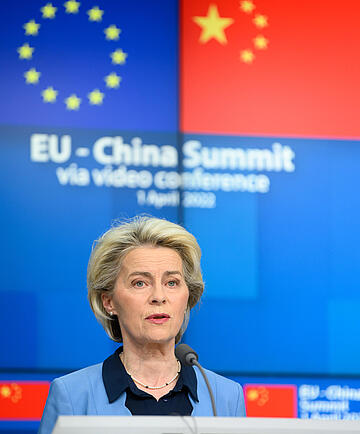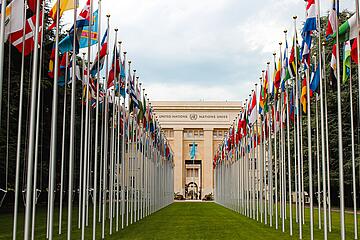Kiel Institute Highlights
Why a new foreign trade strategy is needed
Politically, a rebalancing of the world order has been under way for years and tensions are building. This is also changing the geoeconomic situation. Germany and the EU must adapt to this, as experts from the Kiel Institute pointed out in various articles in 2021. A new strategy for foreign economic policy is overdue.

The previous stance of German governments—that economic and security policy goals should be addressed separately as far as possible—is no longer tenable in view of the changed situation. A report presented to the German Foreign Office in November emphasized that a new strategy should prioritize, inter alia, the establishment and expansion of bilateral strategic partnerships, including an investment and trade agreement with the United States.
“With globalization, interconnectedness increased but so did dependencies. At the same time, the rise of China led to a shift in power in international politics. ... Germany and the EU [must] assess their own vulnerability and develop offensive and defensive strategies for their foreign economic relations,” said Katrin Kamin, lead author of the study and a researcher at the Kiel Institute.
Germany’s prosperity is based on the openness of its economy, but this also makes the country vulnerable, the study notes. For this reason, the German government must be particularly active in shaping its own international economic and political relations and those of the EU. It is important to prevent the decoupling or dismantling of international economic relations.
Germany and the EU must assess their own vulnerability and develop offensive and defensive strategies for their foreign economic relations
Sharpen defensive instruments, strengthen the EU single market
In addition to other important international agreements, e.g., within the framework of the World Trade Organization (WTO), the EU should also introduce more stringent defensive instruments to defend or enforce its own interests. These include monitoring and, if necessary, preventing foreign investment in Germany and the EU as well as further sanctioning instruments. The mere existence of such instruments could have a disciplinary effect without them having to be used.
In addition, the study recommends a number of offensive instruments that focus primarily on access to the EU’s internal market as leverage for a strategic foreign economic policy. These include
- expanding and deepening the internal market—especially in the area of services, the advancement of a banking and capital market union, and the strengthening of the euro as the international reserve currency;
- strengthening the “Brussels effect,” which depends on a successful single market and through which the EU can set international standards;
- maintaining and expanding strategic partnerships with key trading partners—first and foremost an investment and trade agreement with the US and an agreement with India;
- establishing a border adjustment mechanism for CO2 levies—ideally combined with the formation of an open climate club of countries with common climate protection standards.
“The larger, deeper, and more dynamic the EU’s internal market becomes, the better the chances that the EU and its members can help shape the global economic and political order in line with their interests,” Kamin said.

Challenge of Germany’s China policy lies in implementation
With regard to the relationship with China, which is central to Germany and the EU, the new German coalition took a more critical stance in its coalition agreement than the previous government. “However, the concrete formulation remains vague in many places and thus offers potential for conflict within government. This is because differences in the parties’ positions could erupt when it comes to actual implementation of policy toward China. This would suit China,” noted Wan-Hsin Liu, who conducts research on China and other topics at the Kiel Institute, in a Kiel Focus article.
The three parties state in their agreement that Germany’s China policy should in the future be more strongly part of a common EU-China policy and that the relationship with China should be seen in terms of “partnership, competition, but also systemic rivalry.” The Greens and FDP in particular are more critical of China. This is reflected in the coalition agreement, e.g., in the fact that ratification of the EU-China investment agreement is currently not on the agenda and that non-trustworthy companies are to be excluded from the expansion of critical infrastructures.
The specifics of China policy will also depend to a large extent on whether the governing parties find a common position and, if not, who ends up determining the direction. If Foreign Secretary Annalena Baerbock was in charge, Germany’s China policy would tend to emphasize competition and system rivalry. With the Chancellery in charge, as it has been thus far, that would be less likely.
If conflicts were to arise within government, its negotiating position would be weakened, making it more difficult to achieve the defined goals of Germany’s China policy, Liu said: “This would further reduce the chances of developing a common European China policy. The Chinese government would know how to exploit such conflicts for its own advantage.”
Merkel’s meager record in international economic policy
It has to be said that previous governments did not set the bar very high for German foreign economic policy. “Angela Merkel remained committed to a German tradition: geo-economic restraint and lack of ambition. Under her leadership, Germany made no attempt to set out a bold international economic strategy. ... On the contrary. Merkel’s time in office was marked by major geostrategic and trade policy defeats and misjudgments,” commented Gabriel Felbermayr,theKiel Institute’s President at the time,writinginGerman newspaper Handelsblatt in August. No other G7 country is as dependent for its prosperity on foreign trade as Germany. The investment agreement negotiated with China at the end of 2020 shows that more would have been possible in terms of trade policy in 16 years of Merkel governments if Germany had used its influence at the EU level.
Merkel’s most important trade policy legacy remains a free trade agreement with Korea that came into force in 2011. Agreements with individual ASEAN states followed, but multilateral impetus was lacking. On the debit side are the failure of the TTIP trade and investment agreement with the US, a lack of majorities for ratification of the CETA agreement with Canada, and an unfinished agreement with the Latin American MERCOSUR states. Looking at the EU and the single market, which are particularly important for Germany, Felbermayr sees “dramatic failures”: disastrous economic relations with Russia, a lack of trade strategy perspective with Turkey, and, as the biggest trade policy debacle, Brexit. “The EU thus lost its second-largest member, the second-largest net contributor, and an attractive business location,” Felbermayr said.
The EU needs to be able to offer something to countries that are economically strong and attractive, keen on close economic cooperation, but not interested in political integration. As an exporting nation, Germany would stand to benefit most from forging such relationships. “This calls for a strategic idea and a bold concept for implementation that can be presented to the EU Commission and the other member states,” Felbermayr said. That is a key challenge for Merkel’s successors.